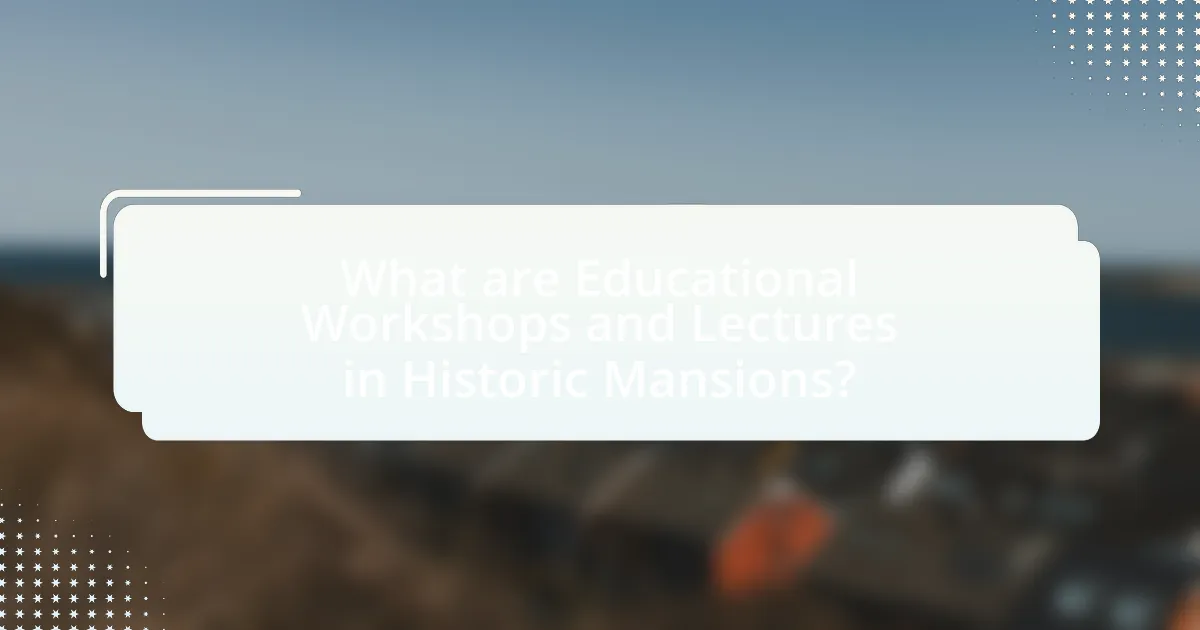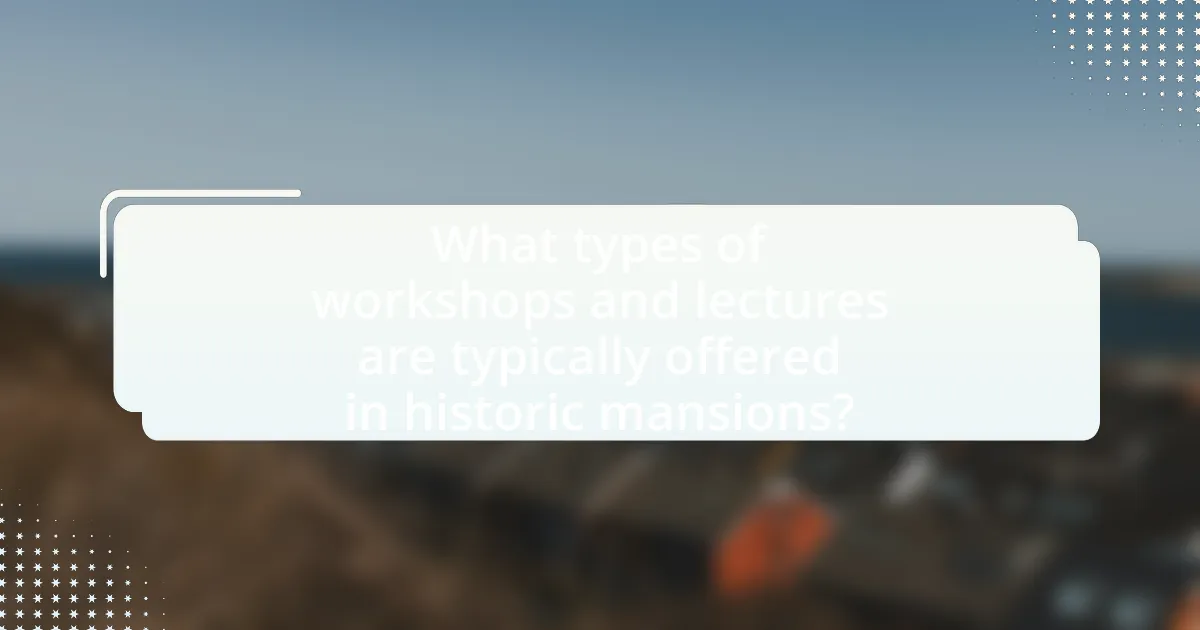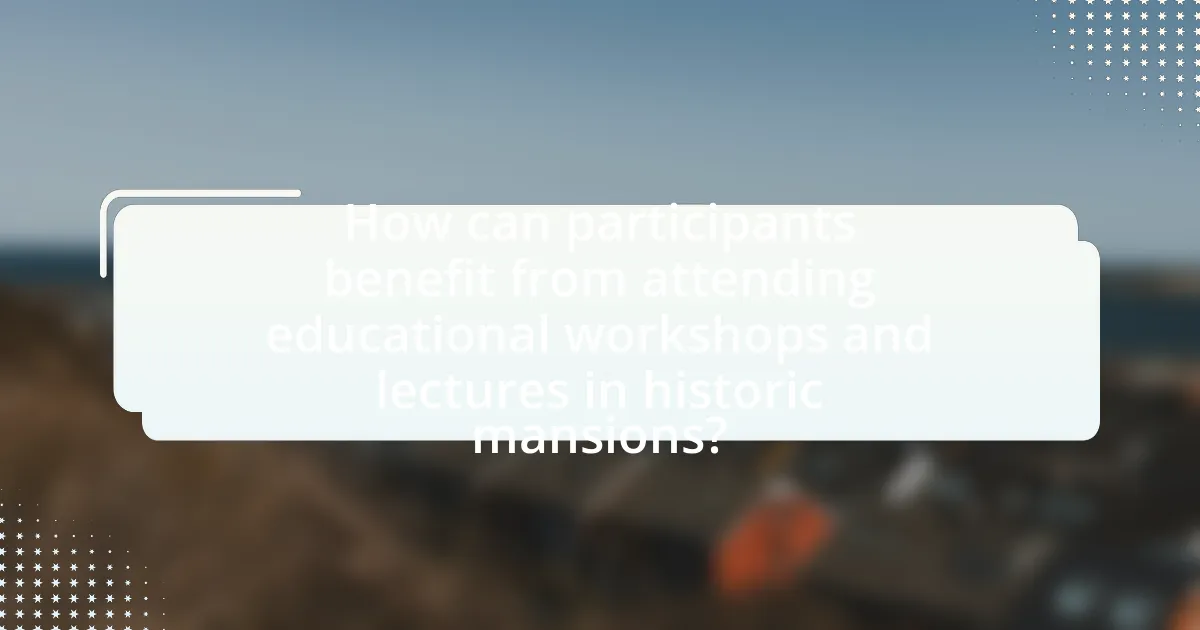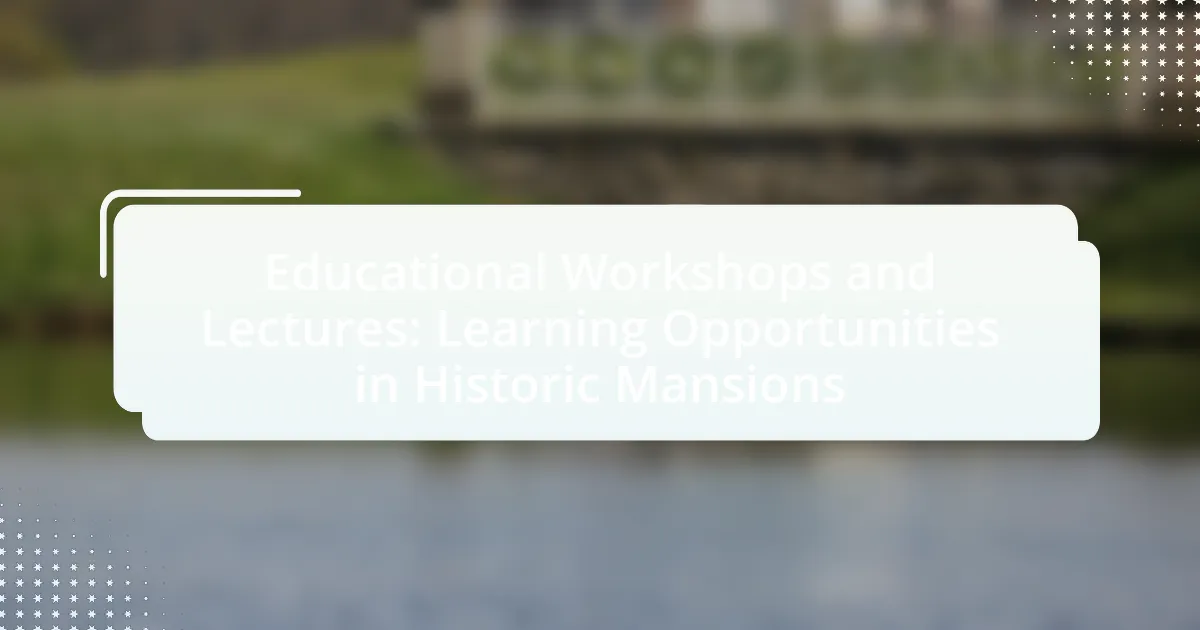Educational workshops and lectures in historic mansions provide structured learning experiences that leverage the unique historical and architectural context of these venues to educate participants on topics related to history, art, architecture, and culture. These immersive programs differ from traditional educational settings by offering hands-on activities and interactive discussions, enhancing knowledge retention and engagement. Participants gain critical skills, foster community involvement, and promote cultural preservation through these experiences, which often include expert-led lectures and practical workshops. The ambiance of historic mansions further enriches the learning experience, making it a valuable opportunity for personal and professional growth.

What are Educational Workshops and Lectures in Historic Mansions?
Educational workshops and lectures in historic mansions are structured learning experiences that utilize the unique historical and architectural context of these venues to educate participants. These events often cover topics related to history, art, architecture, and culture, leveraging the mansion’s heritage to enhance the learning experience. For instance, many historic mansions host workshops that allow participants to engage in hands-on activities, such as art classes or historical reenactments, while lectures may feature experts discussing the mansion’s significance or the era it represents. Such programs not only provide educational value but also promote the preservation and appreciation of cultural heritage.
How do these learning opportunities differ from traditional educational settings?
Educational workshops and lectures in historic mansions differ from traditional educational settings primarily in their immersive and experiential nature. These learning opportunities leverage the unique historical and architectural context of the mansions, providing participants with a tangible connection to the subject matter that traditional classrooms lack. For instance, engaging with artifacts and environments directly related to the topic enhances retention and understanding, as studies show that experiential learning can improve knowledge retention by up to 75%. Additionally, the informal and interactive atmosphere of workshops encourages collaboration and creativity, contrasting with the often rigid structure of conventional education.
What unique features do historic mansions offer for educational purposes?
Historic mansions offer unique features for educational purposes, including architectural diversity, historical artifacts, and immersive environments. The architectural styles of these mansions, such as Victorian, Georgian, or Colonial, provide tangible examples of design evolution and cultural influences over time. Historical artifacts within these properties, such as period furniture, artwork, and documents, serve as primary sources for understanding the social and economic contexts of their eras. Additionally, the immersive environments of historic mansions allow for experiential learning, where visitors can engage with history in a way that textbooks cannot replicate, enhancing retention and understanding of historical events and lifestyles.
How does the ambiance of a historic mansion enhance the learning experience?
The ambiance of a historic mansion enhances the learning experience by providing a unique, immersive environment that stimulates engagement and curiosity. This setting often features architectural details, period furnishings, and historical artifacts that create a tangible connection to the past, making the learning experience more relatable and impactful. Studies have shown that learning in environments rich in history can improve retention and understanding, as the context helps to anchor information in memory. For example, a study published in the Journal of Educational Psychology found that students who learned in historically significant settings demonstrated higher levels of interest and motivation compared to those in conventional classrooms.
Why are educational workshops and lectures important in today’s society?
Educational workshops and lectures are important in today’s society because they facilitate knowledge sharing and skill development among diverse populations. These educational formats promote lifelong learning, enabling individuals to acquire new competencies that are essential in a rapidly changing job market. For instance, according to a report by the World Economic Forum, 94% of business leaders expect employees to pick up new skills on the job, highlighting the necessity of continuous education. Furthermore, workshops and lectures foster community engagement and cultural awareness, particularly in unique settings like historic mansions, where participants can connect with history while learning. This combination of education and cultural enrichment enhances social cohesion and promotes informed citizenship.
What skills can participants gain from these workshops and lectures?
Participants can gain a variety of skills from workshops and lectures held in historic mansions, including critical thinking, historical analysis, and practical skills related to preservation and restoration. These educational experiences often involve hands-on activities that enhance participants’ understanding of architectural styles, historical contexts, and conservation techniques. For instance, engaging with experts in the field can provide insights into the methodologies used in heritage conservation, thereby equipping participants with applicable knowledge and skills relevant to cultural heritage management.
How do these programs contribute to community engagement and cultural preservation?
Educational workshops and lectures in historic mansions significantly enhance community engagement and cultural preservation by fostering local participation and promoting awareness of heritage. These programs encourage community members to actively participate in discussions and activities that highlight the historical significance of their surroundings, thereby strengthening their connection to local culture. For instance, studies have shown that educational initiatives in heritage sites can increase community involvement by up to 40%, as they provide platforms for sharing stories and traditions unique to the area. Additionally, these programs often include hands-on experiences that allow participants to learn traditional crafts or practices, ensuring that cultural knowledge is passed down through generations. This dual focus on engagement and education not only preserves cultural identity but also empowers communities to take pride in their heritage.

What types of workshops and lectures are typically offered in historic mansions?
Historic mansions typically offer workshops and lectures focused on art, history, architecture, and preservation techniques. These educational programs often include hands-on activities such as painting, crafting, or gardening, which relate to the mansion’s historical context. Lectures may feature experts discussing the mansion’s architectural style, its historical significance, or the lives of its former inhabitants, providing attendees with a deeper understanding of the cultural heritage associated with the site.
How are the topics chosen for these educational programs?
The topics for educational programs in historic mansions are chosen based on historical relevance, community interest, and educational value. Program organizers assess the historical significance of the mansion and its surroundings, ensuring that the topics reflect the cultural and historical narratives associated with the site. Additionally, surveys and feedback from the community help identify subjects that resonate with potential attendees, ensuring that the programs are engaging and informative. This approach not only preserves the educational integrity of the programs but also fosters community involvement and interest in local history.
What role do local historians and experts play in shaping the curriculum?
Local historians and experts significantly influence the curriculum by providing authentic, context-rich content that enhances educational programs. Their in-depth knowledge of local history, culture, and heritage allows them to tailor lessons that reflect the unique narratives of the community, making learning more relevant and engaging for students. For instance, local historians can offer firsthand accounts and primary sources that enrich the curriculum, ensuring that it is not only informative but also reflective of the local identity. This collaboration between educators and local experts fosters a deeper understanding of historical events and their implications, ultimately leading to a more comprehensive educational experience.
What are some popular themes or subjects covered in these workshops?
Popular themes covered in educational workshops and lectures at historic mansions include history, architecture, preservation techniques, and cultural heritage. These subjects are often explored through hands-on activities, guided tours, and expert discussions, allowing participants to engage deeply with the historical context and significance of the mansion. For instance, workshops may focus on the architectural styles prevalent during the mansion’s construction period, providing insights into design elements and construction methods used in that era. Additionally, preservation techniques are frequently discussed, emphasizing the importance of maintaining and restoring historic properties to ensure their longevity and educational value.
What formats do these educational events take?
Educational events in historic mansions typically take the form of workshops and lectures. Workshops often involve hands-on activities where participants engage in practical learning experiences related to the mansion’s history or cultural significance. Lectures, on the other hand, usually feature expert speakers who present information on various topics, providing attendees with in-depth knowledge and insights. These formats are designed to enhance understanding and appreciation of the historical context and significance of the mansions, making learning interactive and informative.
How do hands-on workshops differ from lecture-based sessions?
Hands-on workshops differ from lecture-based sessions primarily in their interactive nature. In hands-on workshops, participants engage directly with materials and activities, allowing for experiential learning, while lecture-based sessions typically involve passive listening to an instructor presenting information. Research indicates that active participation in workshops enhances retention and understanding, as evidenced by a study published in the Journal of Educational Psychology, which found that students in interactive learning environments scored significantly higher on assessments compared to those in traditional lecture formats.
What are the benefits of interactive learning in historic settings?
Interactive learning in historic settings enhances engagement and retention of knowledge. This approach allows participants to actively participate in their learning process, fostering a deeper understanding of historical contexts and events. For instance, studies show that experiential learning, such as role-playing or hands-on activities in historic mansions, can increase information retention by up to 75% compared to traditional lecture methods. Additionally, interactive learning promotes critical thinking and collaboration, as learners discuss and analyze historical scenarios together, leading to a more enriched educational experience.

How can participants benefit from attending educational workshops and lectures in historic mansions?
Participants can benefit from attending educational workshops and lectures in historic mansions by gaining unique insights into history, architecture, and culture. These settings provide immersive experiences that enhance learning through direct engagement with historical artifacts and environments. For instance, workshops often include guided tours that highlight architectural features and historical significance, allowing participants to connect theoretical knowledge with tangible examples. Additionally, lectures by experts in fields such as history, art, and preservation offer in-depth understanding and foster critical thinking about the past. Research indicates that experiential learning, such as that found in historic settings, significantly improves retention and comprehension of information.
What networking opportunities arise from these events?
Educational workshops and lectures in historic mansions provide significant networking opportunities for attendees. Participants can connect with industry professionals, educators, and like-minded individuals who share similar interests in history, architecture, and education. These events often feature guest speakers and experts, allowing attendees to engage in discussions, ask questions, and establish professional relationships. Additionally, the intimate setting of historic mansions fosters a conducive environment for informal networking, where participants can exchange contact information and collaborate on future projects. Such interactions can lead to partnerships, mentorships, and access to exclusive resources within the educational and cultural sectors.
How can attendees connect with like-minded individuals and professionals?
Attendees can connect with like-minded individuals and professionals through networking events, discussion panels, and interactive workshops during the educational workshops and lectures held in historic mansions. These settings often foster an environment conducive to collaboration and idea exchange, allowing participants to engage in meaningful conversations. Research indicates that face-to-face interactions in unique venues enhance relationship-building opportunities, as the ambiance of historic mansions can stimulate discussions and networking.
What potential collaborations can emerge from these interactions?
Potential collaborations that can emerge from interactions in educational workshops and lectures at historic mansions include partnerships between educational institutions and heritage organizations. These collaborations can facilitate the development of specialized curricula that integrate local history and architecture, enhancing student engagement and community involvement. For instance, universities may work with historic mansion curators to create experiential learning programs, allowing students to conduct research or participate in restoration projects. Additionally, local governments and non-profits can collaborate to promote these educational initiatives, securing funding and resources to expand outreach and accessibility. Such partnerships not only enrich the educational experience but also foster a greater appreciation for cultural heritage within the community.
What are the personal growth opportunities associated with these programs?
Educational workshops and lectures in historic mansions provide significant personal growth opportunities, including enhanced knowledge, improved critical thinking skills, and increased cultural awareness. Participants engage with expert speakers and diverse topics, fostering intellectual curiosity and expanding their understanding of history and art. Additionally, these programs often encourage networking and collaboration, allowing individuals to build relationships with like-minded peers and professionals, which can lead to further personal and career development. The immersive environment of historic mansions also promotes a deeper appreciation for heritage and preservation, enriching participants’ perspectives on their own lives and communities.
How can participants apply what they learn in their personal or professional lives?
Participants can apply what they learn in their personal or professional lives by integrating new skills and knowledge gained from educational workshops and lectures into their daily routines and work practices. For instance, if participants learn effective communication techniques during a workshop, they can implement these strategies in their workplace to enhance team collaboration and improve client interactions. Research indicates that experiential learning, such as that offered in historic mansion settings, fosters retention and application of knowledge, making it more likely for participants to utilize what they have learned in real-world scenarios.
What impact can these experiences have on an individual’s perspective or creativity?
Experiences gained from educational workshops and lectures in historic mansions can significantly broaden an individual’s perspective and enhance creativity. Engaging with historical contexts and diverse narratives fosters critical thinking and encourages innovative ideas. For instance, studies show that immersive learning environments, such as those found in historic settings, stimulate cognitive flexibility, allowing individuals to connect disparate concepts and generate novel solutions. This is supported by research from the University of California, which found that experiential learning increases creative problem-solving skills by 30%. Thus, participation in these workshops not only enriches knowledge but also cultivates a more imaginative and open-minded approach to various challenges.
What practical tips can enhance the experience of attending these workshops and lectures?
To enhance the experience of attending workshops and lectures in historic mansions, participants should actively engage with the content by asking questions and participating in discussions. Engaging with the material fosters a deeper understanding and retention of information. Additionally, taking notes during sessions can help capture key points and insights, which is supported by research indicating that note-taking improves memory recall (Mueller & Oppenheimer, 2014). Furthermore, arriving early allows attendees to familiarize themselves with the venue and network with other participants, creating a more enriching experience. Lastly, following up with speakers or fellow attendees after the event can lead to valuable connections and further learning opportunities.

Leave a Reply